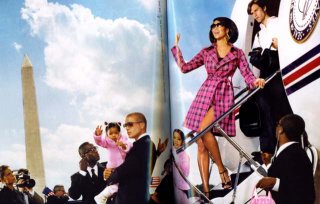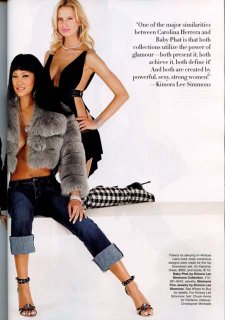TheSoCalledPrep
Active Member
- Joined
- Nov 30, 2003
- Messages
- 5,282
- Reaction score
- 1
Careering back and forth between Paris and St. Louis, Kimora did make Honor Society and graduated on time with the help of a catch-up coach. Her mother was thinking college and tried to stop Kimora from frittering away her tiny fortune. But at the age of 15, she’d bought herself a Rolex and a secondhand BMW drop-top, before she even had a driver’s license. Accidents ensued—a surgeon put 40 stitches in her face. Some girls spray-painted the car. At Dillard’s, the other models hissed about the Pomeranian now poking out of Kimora’s la-di-da Louis Vuitton carryall. Life in St. Louis had been torture since grade school; five ten at the age of 10, Kimora was always knocking into things. “****** giraffe! ****** giraffe!” the other kids taunted.
“That’s how I got into trouble, because it was the cute little white girls who were accepting of me,” Kimora recalls. “And all the black kids said, ‘She thinks she’s white!’ ” If only her black father had been around more, they might have accepted her as black. “There was no Asian anything,” she says, in her lower-middle-class neighborhood of Florissant.
Kimora Lee’s father, she says, was the first black deputy federal marshal in St. Louis, exclamation point. The rest of the story is generally redacted. He was out of the picture before she was born, but when she saw him every so often, he reminded her of Billy Dee Williams: six one, a charmer, very, very intelligent. “That’s probably one of his problems,” Kimora says. “You can be the law or you can be running from the law, and because you’re smart, you can go either way.”
Like his daughter, Vernon Whitlock Jr. distinguished himself early: Graduating at the top of his police-academy class in St. Louis, he was recruited by the marshals in 1962. He told people he marched with Reverend Martin Luther King Jr. from Selma to Montgomery, Alabama. “My grandmother’s first cousin was Frederick Douglass,” he would say.
After ten years, Whitlock quit to be an Equal Employment Opportunity Commission investigator; the money was better, and it got even better when he became a bail bondsman in the late seventies. But he was such a superfly, with his flashy cars and clothes and diamond-chip rings, and such a braggart—trading bonds for jewelry or sex with inmates’ girlfriends, court papers alleged, and dealing cocaine and synthetic heroin—that in 1985, he was targeted by several law-enforcement agencies.
“Vernon was the kind of guy that women waggled for if they saw him—flamboyant, outspoken, fun, and funny,” remembers Guinn Kelly, the undercover cop who brought him down. The arrest at a Steak n Shake made the local news.
Sentenced to 24 years when Kimora was in grade school, Whitlock was sprung after just 3: He swaggered into the local marshal’s office and told ex-co-workers he’d turned state’s evidence against his supplier. Now a barber, Whitlock was a guest at Kimora’s St. Barts wedding and captured the ceremony on video, which he screens for customers at his shop.
Her mom’s story is very Joy Luck Club, Kimora says. Joanne Perkins was born into the chaos of the Korean War and later adopted by an American serviceman who had spotted her mother filling sandbags in Inchon. Joanne maintains that her “full-blooded Japanese” mother went to Korea from Kyoto as a refugee during World War II, though this would make her a historical anomaly. There were few, if any, refugees from Kyoto, since it was never bombed, and those who left for Korea at the war’s end were invariably ethnic Koreans who were repatriating.
Joanne Perkins worked as an administrator for Social Security and has retired to a house in East Hampton that Kimora bought for her. Perkins now calls herself by her mother’s name, Kyoko, baffling longtime acquaintances. For Kimora, the link to her Japanese heritage represents another marketing opportunity. “I cannot wait to get Kimora on a plane and take her to Japan,” says Russell, “because I know they’re going to go crazy.”
“I consider myself to be one of the black women in fashion who made it,” Kimora says. “But black women don’t look at me like that.”
“A number of them probably think Russell should be married to a black woman,” says Emil Wilbekin, the editorial director of Vibe magazine. Kimora’s efforts to speak homegirl annoy them, too, like when she introduced Russell at an awards show as “my baby daddy,” a ghetto expression usually used by a woman who has a baby out of wedlock to get money, says Wilbekin. In negotiations for TV shows and movies, race remains an issue: Is Kimora Lee Simmons black enough?
But her autograph signings have the teenage cuties with Baby Phat cats tattooed to their badonkadonks in fits. Kimora just got one herself.
“That’s how I got into trouble, because it was the cute little white girls who were accepting of me,” Kimora recalls. “And all the black kids said, ‘She thinks she’s white!’ ” If only her black father had been around more, they might have accepted her as black. “There was no Asian anything,” she says, in her lower-middle-class neighborhood of Florissant.
Kimora Lee’s father, she says, was the first black deputy federal marshal in St. Louis, exclamation point. The rest of the story is generally redacted. He was out of the picture before she was born, but when she saw him every so often, he reminded her of Billy Dee Williams: six one, a charmer, very, very intelligent. “That’s probably one of his problems,” Kimora says. “You can be the law or you can be running from the law, and because you’re smart, you can go either way.”
Like his daughter, Vernon Whitlock Jr. distinguished himself early: Graduating at the top of his police-academy class in St. Louis, he was recruited by the marshals in 1962. He told people he marched with Reverend Martin Luther King Jr. from Selma to Montgomery, Alabama. “My grandmother’s first cousin was Frederick Douglass,” he would say.
After ten years, Whitlock quit to be an Equal Employment Opportunity Commission investigator; the money was better, and it got even better when he became a bail bondsman in the late seventies. But he was such a superfly, with his flashy cars and clothes and diamond-chip rings, and such a braggart—trading bonds for jewelry or sex with inmates’ girlfriends, court papers alleged, and dealing cocaine and synthetic heroin—that in 1985, he was targeted by several law-enforcement agencies.
“Vernon was the kind of guy that women waggled for if they saw him—flamboyant, outspoken, fun, and funny,” remembers Guinn Kelly, the undercover cop who brought him down. The arrest at a Steak n Shake made the local news.
Sentenced to 24 years when Kimora was in grade school, Whitlock was sprung after just 3: He swaggered into the local marshal’s office and told ex-co-workers he’d turned state’s evidence against his supplier. Now a barber, Whitlock was a guest at Kimora’s St. Barts wedding and captured the ceremony on video, which he screens for customers at his shop.
Her mom’s story is very Joy Luck Club, Kimora says. Joanne Perkins was born into the chaos of the Korean War and later adopted by an American serviceman who had spotted her mother filling sandbags in Inchon. Joanne maintains that her “full-blooded Japanese” mother went to Korea from Kyoto as a refugee during World War II, though this would make her a historical anomaly. There were few, if any, refugees from Kyoto, since it was never bombed, and those who left for Korea at the war’s end were invariably ethnic Koreans who were repatriating.
Joanne Perkins worked as an administrator for Social Security and has retired to a house in East Hampton that Kimora bought for her. Perkins now calls herself by her mother’s name, Kyoko, baffling longtime acquaintances. For Kimora, the link to her Japanese heritage represents another marketing opportunity. “I cannot wait to get Kimora on a plane and take her to Japan,” says Russell, “because I know they’re going to go crazy.”
“I consider myself to be one of the black women in fashion who made it,” Kimora says. “But black women don’t look at me like that.”
“A number of them probably think Russell should be married to a black woman,” says Emil Wilbekin, the editorial director of Vibe magazine. Kimora’s efforts to speak homegirl annoy them, too, like when she introduced Russell at an awards show as “my baby daddy,” a ghetto expression usually used by a woman who has a baby out of wedlock to get money, says Wilbekin. In negotiations for TV shows and movies, race remains an issue: Is Kimora Lee Simmons black enough?
But her autograph signings have the teenage cuties with Baby Phat cats tattooed to their badonkadonks in fits. Kimora just got one herself.


 Have you noticed her double chins and triple layered neck? Disgusting
Have you noticed her double chins and triple layered neck? Disgusting 



